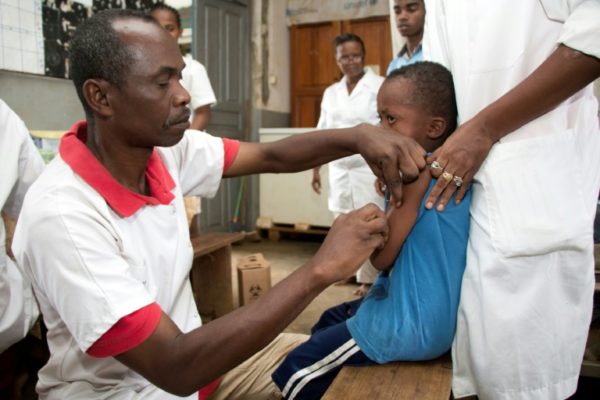Date 2019-04-17
Category Food & Health

So far this year, 170 countries have reported 112,163 measles cases to WHO. At this time last year, 163 countries had reported 28,124 cases.
The most dramatic rise in cases through the early part of the year was reported in Africa, which has weaker vaccination coverage than other regions. Africa saw a 700-per cent increase compared to last year.
At least 800 children have died from measles since September in Madagascar, where rampant malnutrition and a historically poor vaccine rate are driving the world’s worse current outbreak.
In conflict-scarred Yemen, cases shot up more than 300 per cent in 2018 compared to 2017.
Venezuela, where the disease was once contained, has also seen tens of thousands of cases as the country’s economic and political crises continue to push the healthcare system to the brink of collapse.
Measles, which is highly contagious, can be entirely prevented through a two-dose vaccine, but the World Health Organization (WHO) has in recent months sounded the alarm over slipping vaccination rates.
“Preliminary global data shows that reported cases rose by 300 per cent in the first three months of 2019, compared to the same period in 2018. This follows consecutive increases over the past two years,” it said in a statement.
“While this data is provisional and not yet complete, it indicates a clear trend. Many countries are in the midst of sizeable measles outbreaks, with all regions of the world experiencing sustained rises in cases,” it added.
The agency noted that only about one in 10 actual measles cases are reported, meaning the early trends for 2019 likely underestimate the severity of the outbreaks.
Measles — an airborne infection causing fever, coughing and rashes that can be deadly in rare cases — had been officially eliminated in many countries with advanced healthcare systems.
But the so-called anti-vax movement — driven by fraudulent claims linking the MMR vaccine against measles, mumps and rubella, and risk of autism in children — has gained traction.
Repeated studies — the most recent involving more than 650,000 children monitored for more than a decade — have shown that there is no such link.
But according to WHO, global coverage for the first vaccine dose has been “stalled” at 85 per cent, while 67 per cent of people has received the second dose.
The provisional 2019 data shows that cases have spiked “in countries with high overall vaccination coverage, including the United States,” WHO warned.
“The disease has spread fast among clusters of unvaccinated people,” it added.
New York’s mayor declared a public health emergency in parts of Brooklyn last week after a measles outbreak emerged in an ultra-Orthodox Jewish community, where some had resisted vaccination on religious grounds.
Calls have mounted in several countries to make measles vaccinations mandatory, including in Germany. Australia earlier this month launched a major education campaign to encourage residents to get vaccinated.
(NAN)